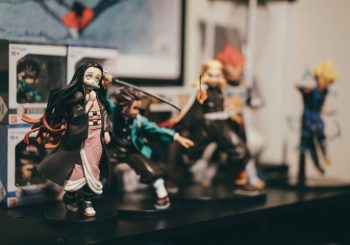Sometimes, the most ruthless criminals can express the fiercest loyalty, while the most obedient police officers can be susceptible to betrayal. Sometimes, an allegedly legal action might have hidden illegal motives, while an illegal act might be driven by a greater good.
Some carry the weight of their struggles, while others inflict theirs on the world. Some wear their scars, others wield them.
Over the last few years, Korean dramas have become widely popular, reaching even Middle Eastern homes. For the most part, they have been celebrated for how they tackle complex issues. Korean dramas remind us that human behavior defies easy categorization, yet one quality reigns supreme: sincerity. It is not wealth, status, or even good deeds that define a character, but the genuineness behind them. Sincerity guides us to someone’s true self, unclouded by circumstance or social judgement.
While there are plenty of Ramadan series to choose from, Korean dramas offer an interesting alternative that can ignite self-reflection and contemplation. Below is a list of short Korean dramas that delve into the depth of human nature, tackling key social issues that are also relevant to Egyptian society.
The Kidnapping Day (2023)
This Korean drama explores how poverty, status, desperation, and child abuse intertwine.
It starts with a seemingly clear-cut scenario: Kim Myeong-jun, a struggling father, is forced to kidnap a young girl, Choi Ro-hee, to pay for his own daughter’s medical bills. Yet the drama quickly turns into a plot twist, as Myeong-jun, the kidnapper, ends up becoming the child’s only protector.
The focus shifts from the initial kidnapping to a deeper exploration of the bond that forms between Myeong-jun and Ro-hee, and how the true meaning of kidnapping is completely redefined. Despite not being her blood relative, Myeong-jun assumes the role of the only true father Ro-hee has ever known.
The show suggests that true family is not always about blood ties, but about the bonds of love, trust, and protection. Myeong-jun, the initial kidnapper, ends up becoming the one who offers Ro-hee a true safe haven from her family who abused her for their own profit.
While authorities considered him a kidnapper, the drama unfolds to show his motives were to save Ro-hee from a terrible ordeal. The drama presents a particularly potent and symbolic scene in its final episode, where Ro-hee, the child, delivers testimony in court that challenges the perception of Myeong-jun as her kidnapper.
This powerful moment serves as a testament to the importance of acknowledging the perspectives of children and empowering them to speak out against abuse, even when it may originate within their own family unit.
Set against the backdrop of Egyptian society, this drama delves into the complex web of factors that contribute to child abuse. It exposes how abuse becomes normalized and ingrained within the social fabric, with schools, businesses, industries, and even authorities playing a role. For instance, the education system, obsessed with high achievers, pushes aside and neglects children deemed unsuccessful and useless in society.
In Egypt, the education system remains rooted in a strict ranking approach. This system judges children solely on their perceived intelligence and IQ scores, overlooking their individual circumstances, unique strengths, and personal ambitions. Children, pressured to excel in this rigid hierarchy, internalize the abusive methods. They resort to cheating or even sabotaging others to gain favor from authority figures – teachers, professors, and even authorities – becoming pawns in the pursuit of high rankings.
More importantly, the drama emphasizes the process of dehumanizing children when they are viewed as resources, tools for achieving national goals, rather than valued individuals in their own right. This leads to not only their exploitation, but also their loss of selfhood. Even those in power exploit children, conducting experiments to find a genius child for national gain.
It also delves into how cycles of abuse can perpetuate violence, with the mistreated child potentially resorting to harmful behavior in their adulthood. While there are a few studies on child abuse in Egypt, one study estimated that 93 percent of Egyptian children between the ages of one and fourteen experience violence, according to the National Council for Childhood and Motherhood.
While the drama tackles the issue of kidnapping, which is also a prevalent phenomenon in Egypt, it transcends simplistic societal categorizations, such as kidnappers from lower socioeconomic backgrounds targeting upper-class children. Kidnapping can be manifested in many forms, with the case of Ro-hee being exploited by her family for their genius child scientific experiment.
The narrative unveils a more nuanced reality, demonstrating how abuse can also be perpetrated within the upper class, even disguised under the veil of scientific advancement and purportedly noble intentions.
The Worst of Evil (2023)
This Korean drama dives headfirst into the murky world of illegal drug trade, and asks the question: can police officers ever truly justify using illegal means, becoming the very monsters they fight, for the greater good?
The series follows Park Joon-mo, a young cop yearning for recognition, who gets his chance by going undercover within a global black market. However, the line between cop and criminal blurs as Joon-mo navigates a world of violence, betrayal, and moral ambiguity.
The drama defies the simplistic notion of the greater good by questioning who gets to define it. Is it the police force, desperate to dismantle a powerful drug ring? Is it the undercover officers, sacrificing their moral compasses for their mission? Or is it the very people caught in the crossfire, the addicts and their families whose lives are ravaged by the drug trade?
In the final episode, the series exposes how the pursuit of the greater good can corrupt even the most well-intentioned police officers. It compels us to question whether the ends ever truly justify the means, especially when the means involve compromising the very ideals that law enforcement is supposed to uphold.
When viewed through the lens of Egyptian society, this Korean drama offers a poignant look at the human stories intertwined with the drug trade. It does not aim to simply humanize the characters involved, but rather to explore the choices and circumstances that shape their destinies.
The series portrays the stark reality that addiction is not always a personal failing. In Egypt, for example, some individuals might be forced into drug use by exploitative family members. This Korean drama underscores this crucial distinction, differentiating between those drawn to the drug through personal willingness, and those who become victims trapped in a cycle of abuse.
Egypt’s fight against drug use has seen progress, particularly in reducing it among public employees. However, the drama highlights a crucial point: tackling drug use goes beyond just the drugs themselves. It’s about addressing the underlying social issues and systems that contribute to addiction, such as poverty and unemployment.
In the drama, this principle is illustrated in the success of Park Joon-mo in achieving his mission by working with and supporting Lee Hae-ryeon, a survivor of drug trafficking and abuse. Her experience proved that supporting victims trapped in the cycle can be just as effective as dismantling large drug operations.
The Killing Vote (2023)
This Korean drama delves into the erosion of trust in the legal system and the rise of vigilante justice fueled by public opinion. The series explores the dangerous consequences of blurring the lines between legal and illegal when the public becomes judge, jury, and potentially, executioner.
It portrays a fictional system where citizens can vote online to decide the fate of criminals. This premise reflects a growing distrust in traditional legal institutions, which can be slow, bureaucratic, and perceived as corrupt. The drama taps into the frustration people feel when they believe the legal system fails to deliver justice.
The drama exposes the pitfalls of a system based on online popularity contests. Mob mentality can easily take hold, leading to decisions based on emotion rather than due process.
In an Egyptian context, the drama looks at the consequences of a public that abandons faith in legal and authoritative institutions. When the justice system loses its legitimacy, it can create a dangerous power vacuum, leading people to condone, or even celebrate, criminal actions.
Egypt has grappled with a disturbing trend of high-profile crimes becoming media spectacles. Cases like Naira Ashraf and Habiba El-Shamaa have been sensationalized by media outlets, TikTok content creators and bloggers seeking views and profit.
This irresponsible coverage often involves speculation, victim-blaming, and even siding with the accused, further traumatizing the victims and their families.
This disturbing trend is evident in the drama, which portrays how crimes become media fodder, overshadowing the legal process. The drama highlights how criminals can exploit this media frenzy to evade justice and inflict further suffering on their victims.







Comments (0)